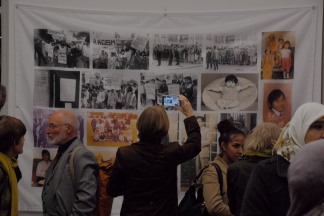In childhood, I frequently got in to trouble for asking the question ‘Why?’ Grown-ups rarely appreciated me drawing attention to life’s inequalities or holding them to account. When I did receive an answer it was seldom satisfying. ‘Why can only kids in the top set become school librarians?’ ‘Why does the football team have better equipment and uniforms than the netball team?’, ‘Why do I have to run 800 metres in PE, just to prove how slow I am?’
This week I spent a refreshing day in the company of like-minded people who are all asking ‘Why’ too. The event was organised by the Wilberforce Institute and held at The Friends Meeting House in Euston. Throughout the day, professionals working in Museums, Libraries and Archives shared varied approaches to the contentious issue of ‘De-Colonising’ historic collections, exploring if and how it might be possible to tackle racism in the presentation of material culture relating to BAME heritage.
Most examples were given by individuals struggling within the constraints of their respective organisations, to ask unpalatable questions. Some had been assigned the task of addressing issues single-handedly and were straining under the weight of the responsibility. Others were immersed in direct action but lacked the necessary resources. Thanks to everyone involved for sharing their extensive experience and insight. The process of connecting and supporting one another felt very powerful and significant.
My colleague Hannah Niblett and I are in the more fortunate position of working for an organisation specifically established to combat racism. Yet there are still challenges of working ethically using co-production methods. In our paper ‘De-Centering the Power of the Archive’ we described how the work of the Ahmed Iqbal Ullah Centre and Trust supports the development of community archives, which in turn influences the type of histories promulgated by historians. We also reflected on issues of agency, power, capacity and sustainability, given the complex ways that our organisation is funded (by Manchester City Council, the University of Manchester and the Heritage Lottery Fund).
Whilst in London I also took the opportunity to visit ‘The Museum of Emotion’ by artist Kader Attia at the Hayward Gallery. Kader’s work explores ‘the ways in which colonialism continues to shape how Western societies represent and engage with non-Western cultures’. Compelling and creative food for thought along the same lines of the ‘De-Colonising’ seminar. A truly informative few days, where I had the space to ask ‘Why?’ repeatedly and unashamedly. I know I am blessed!





